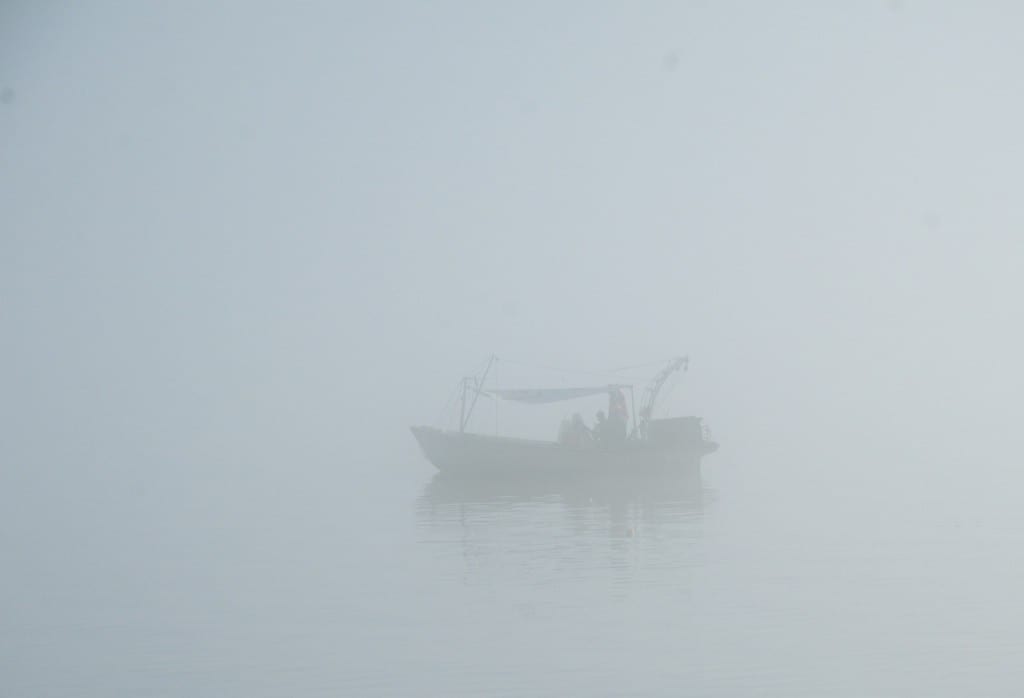The Foggy Picture -Â
By Glynn Wilson –
MOBILE, Ala. — The sun is shining and the air is cool and dry today along the Gulf Coast, so it may seem strange or funny to read about fog. But I have been thinking about this piece for days, when this port city was so enshrouded in a heavy fog that it was nearly impossible to see the Mardi Gras floats go by while standing right in front of them.
At times it was so thick the fog seemed like rain. The live oak tree limbs became so soaked the water dripped from the leaves sounding like rain on roof tops. To make matters worse, the smell it carried was so putrid from coal dust and petrochemical plant pollution that it made me afraid to go outside, fearing it was as toxic as the Great Smog of London in the 1950s or the killer fog from the 2007 film “The Mist,” based on the scary Stephen King story.
All the while this fog enshrouded the town outside, I was wading through the fog of information on Google, trying to find enough research to shine some light on our current and future existential predicament: Will human beings find a way to survive on planet Earth or beyond?
Once again, as I have written in the past, I found Google itself about as helpful as trying to find a healthy meal while digging around in the rotting garbage of a giant landfill. So I turned to Bing in Safari instead.
Having spent six years in a Ph.D. program in Science Communication and Environmental Sociology a few years back, I was curious to see if I could find the latest risk assessments on the threats to human survival. There are lots of ways to think about this, but as I learned back when, the problem is probably too big for the human brain to solve. It might take some Artificial Intelligence and will certainly take lots of computing power.
Just so the average reader will know, risks are categorized by some on a scale from negligible, marginal and critical to catastrophic. One example.
Other scales have been developed to rank risks according to event likelihood. See here.
Lot’s of work is being done to assess the potential risk of the impact of various events and to try to prioritize them. See here.
As I learned back in the day, there are short-term acute threats that could kill us right way, versus long-term, chronic threats that will take a long time.
To understand this on the individual level, a bullet to the brain would be a quick way to kill yourself. An unhealthy lifestyle will take longer.
On the collective level, a full-scale global nuclear war would take out most of us. On the other hand, one reason it seems hard to get policy makers focused on climate change due to global warming from the burning of fossil fuels is that the effects tend to be long-term and out there in the future somewhere, even though more and more scientists are saying the impacts are already being felt — and the time to act is growing short.
Human-Induced Global Warming Impacts Are Already Being Felt by Life on Earth
We Should All Be Talking About the Green New Deal
Climate change is also considered a major threat to our national security, although the president wants to Trump up a crisis on the southern border that most experts say does not constitute a national emergency.
If I had the budget, I could travel the world over and interview all manner of scientists myself. Fortunately with the internet I don’t necessarily have to do that. I can piggy back on what others find.
One of the most useful intellectual yet popular articles I found on the subject was a five year old piece in , written by the editor of The Atlantic who oversees Science, Health and Technology coverage. He visited the Future of Humanity Institute at OxFord University in England, raising the question: “When we peer into the fog of the deep future what do we see – human extinction or a future among the stars?”
After exploring the science on previous mass extinctions on earth, from cosmic impacts like asteroids to previous episodes of massive climate change, and talking to scientists and philosophers on the threats from nuclear weapons to outbreaks of deadly diseases and overpopulation, the conclusion ends up being that Artificial Intelligence itself may be the gravest threat we face.
While that may seem prima facie (on the face of it) to appear absurd, it could come true — if lots of other more serious and immediate threats don’t get us first.
I suspect this research has been updated somewhere, but I ran out of time and grew tired of searching to find out. I found out enough to know that no one is even considering what I consider to be a potentially more grave and immediate short-term threat than perhaps anything else: A major, global financial collapse that sends the world into a depression and chaos.
This occurred to me during the recent U.S. government shutdown, when my mind reeled with all the potentially dystopian outcomes this could have. I will save all those details and scenarios I imagined for the day when I find someone to fund a film about this.
But just think what could have happened if the government had remained shut down a few more days or weeks and the hackers were able to get into the computers controlling the power grid and all the banks. If the power went out and all the ATMs in the U.S. stopped working and the American economy collapsed because of it, causing all kinds of chaos and violence in such a rich country, imagine what the impacts could be in the rest of the world where financial unrest is already causing mass migrations of poor people.
There must be some social scientist somewhere writing around the edges about the causes or potential solutions to this threat. If so I could not find it using a search engine.
Of course the root causes of this threat are the lack of political leadership and will to take it on — and the lack of effective communications strategies and news outlets to get the word out and make people understand. Newspapers and television are way too focused on the now, jumping from one sensational headline and tweet to the next, and even social media algorithms cannot stay focused on a problem long enough to bring it into focus out of the fog.
Like the fog of war, when bad political decisions are made based on bad intel, and those decisions lead to even worse outcomes, the risk of miscalculation is great. As I was thinking about this, I also considered other theories, including one sometimes call the domino effect. One bad decision leads to another, then another, until the entire system falls down and ends up in a pile of rubble.
This is what happened in 1929 that lead to a decade-long Great Depression only a world war could get us out of. It almost happened in 2007-2009. It took a very smart African-American Senator and president to think us out of that one, although half the population is still in denial about this.
The problem with any computer-based solution to any problem is that the program is limited to what humans are smart enough to plug into the algorithm. All it will take is one missed question and the house of cards could come crumbling down.
When the shit goes down, where would you rather be? In a poor, overpopulated, urban area full of crazy people with loaded firearms? Or out in the mountains somewhere away from everybody?
For me the answer is obvious. The problem is deciding when it’s time to flee and exactly where to go. There’s also the problem of financing.
The fog of human thinking alone makes this a problem. But then again, some days the sun shines.
Maybe there are enough of us who are smart enough to figure all of this out in time. Perhaps everything will work out and the end will be so far out in the future there’s no need for us to spend time thinking about it.
Or then again, maybe not. The crash could be right around the next corner on the calendar.
I guess there’s only thing to do in the meantime. Try to have some fun while getting people to think about the problems. That’s been my strategy all along.
If it all goes south, it’s not going to matter anyway. If we can’t get people to listen and understand, we may as well go down swinging. See you on the mountain trail — if you make it out in time.














